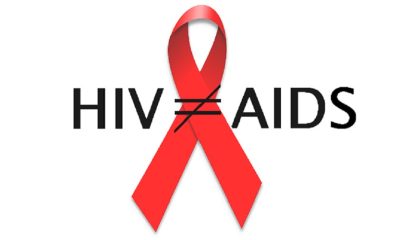Health
Experts identify factors responsible for sudden death during sex

By Francesca Hangeior
Experts in the field of urology and cardiology have identified uncontrolled hypertension and heart disease as the commonest causes of sudden death during sexual intercourse.
The physicians advised people with these conditions not to engage in sexual activities until they receive appropriate treatment and are certified fit for strenuous activities such as sex by experts.
One of the experts, a Consultant Urologist, Dr. Gabriel Ogah, said people with hypertension and heart disease should control them before engaging in sexual activities.
Ogah said because sex is a strenuous exercise, people must be medically fit to engage in the exercise.
The urologist who is the Managing Director, Ogah Hospital and Urology Centre, Fugar, Edo State, said young people rarely die during sex because they are fit for it.
Giving further insight into the issue, the senior medical practitioner said, “If you have hypertension, make sure you control it before you have sex. If you have heart disease, make sure you control it before you have sex. Because sex is a strenuous exercise, if people are not medically fit for it, especially if they have heart disease, they could die during the exercise. That is why people die during sex.
“You do an exercise that you do not have the power to do and because sex is sweet and intoxicating, he continues the exercise until the person gives up.
“People die during sex because they are not medically fit for the exercise and commonly, their main problem is that they have cardiac disease and people with cardiac disease are not supposed to engage in very strenuous exercise.
“And because sex is a strenuous exercise, it is an intoxicating exercise, it is a sweet exercise, so they don’t stop doing it until the exercise kills them.”
The physician reiterated that the commonest cause of death during sexual intercourse was a heart disease that was left untreated.
Ogah noted, “And when we talk about heart disease, hypertension is one of them.
“The blood pressure could go up during the exercise and you now have sudden death. High blood pressure that is not controlled and has not caused heart disease yet, can kill someone during sex because sex can make the blood pressure go up suddenly.”
He advised people to avoid using sex-enhancing drugs not medically prescribed.
“Don’t take sex-enhancing drugs which are not medically prescribed. Don’t take any sex-enhancing drugs without a doctor’s prescription”, he counseled.
Mayo Clinic says high blood pressure could impact sexual activity negatively especially in men, stressing that a link between high blood pressure and sexual problems has been proved in men.
“Over time, high blood pressure damages the lining of the blood vessels and causes arteries to harden and narrow (atherosclerosis), limiting blood flow. This means that less blood flows to the penis.
“For some men, the decreased blood flow makes it difficult to achieve and maintain erections. This problem is called erectile dysfunction. It’s fairly common.
“Even a single episode of erectile dysfunction can cause anxiety. Fears that it will happen again might lead men to avoid sex, which can affect their relationship with their sexual partners.
“High blood pressure can also interfere with ejaculation and reduce sexual desire. Some blood pressure medications may cause similar effects.
“Men should discuss any concerns with their doctors”, the clinic said.
Data from the American Heart Association says considerable apprehension often surrounds the issue of sudden cardiovascular arrest during physical activity, especially that related to sexual intercourse.
The association states that cardiovascular effects during coitus have been studied by monitoring volunteers.
“Hemodynamic changes, including increased heart rate, respiratory rate, and blood pressure, have been identified, especially during orgasm.
“The increased cerebral perfusion pressure when intracranial pressure decreases abruptly during orgasm results in maximal wall tension in cerebral aneurysms, which could explain the higher proportion of subarachnoid hemorrhage”, it noted.
A heart specialist, Dr. John Asekhame, told our correspondent that most cases of sudden slump were linked to undiagnosed and untreated cases of cardiac and non-cardiac health conditions.
Asekhame, a Consultant Physician and Cardiologist with Providence Multi-Specialty Hospital, Abuja, said, uncontrolled blood pressure, malaria, low blood sugar, and excessive dehydration can cause a person to suddenly slump.
According to the Centres for Disease Control and Prevention, a normal blood pressure range is less than 120/80 mmHg.
Uncontrolled blood pressure, according to Asekhame, can cause health problems like stroke and cardiac complications at any time without giving a sign.
The cardiologist urged Nigerians to embrace the culture of going to pharmacies and hospitals to check their blood pressure and get proper treatment if it is high.
Health
FG identifies 1,277 persons for monitoring as Lassa fever kills 122

The Nigeria Centre for Disease Control and Prevention has listed 1,277 persons for follow-up over the possibility of being infected with Lassa fever. This follows the centre recording 659 confirmed cases out of 3,779 suspected cases and 122 deaths in 13 weeks (from January to March 30, 2025).
A report obtained from the NCDC on Friday indicated that no fewer than 18 states across the country have recorded Lassa fever cases, with Ondo, Bauchi, and Edo being the most affected.
The report partly reads, “Cumulatively, in week 13 of 2025, 122 deaths have been reported, with a Case Fatality Rate of 18.5%, which is lower than the CFR for the same period in 2024 (18.7%).
“In total for 2025, 18 states have recorded at least one confirmed case across 93 Local Government Areas. Seventy-one per cent of all confirmed Lassa fever cases were reported from these three states (Ondo, Bauchi, and Edo), while 29% were reported from 15 other states with confirmed Lassa fever cases. Of the 71% of confirmed cases, Ondo reported 30%, Bauchi 25%, and Edo 16%.
“The predominant age group affected is 21-30 years (Range: 1 to 94 years, Median Age: 30 years). The male-to-female ratio for confirmed cases is 1:0.8. The number of suspected cases increased compared to that reported for the same period in 2024. No new healthcare worker was affected in week 13. The National Lassa fever multi-partner, multi-sectoral Incident Management System (IMS) was activated to coordinate the response activities at all levels.”
The report shows that the contacts under follow-up number 1,277, while the contacts that have completed follow-up total 1,448.
According to the NCDC, the disease has affected 20 healthcare workers in eight states so far this year.
Lassa fever is an acute viral haemorrhagic fever caused by the Lassa virus. The natural reservoir for the virus is the multimammate rat (also known as the African rat), although other rodents can also act as carriers.
The public health institute stated that Lassa fever cases occur year-round, with peak transmission periods typically from October to May.
Health
WHO calls for countries to address disruptions to TB services

In the wake of massive cuts in US funding, the World Health Organization (WHO) today called on global health leaders, donors, and policymakers to protect and maintain tuberculosis (TB) care and support services around the world.
In a statement issued ahead of World Tuberculosis Day (March 24), the WHO said the “drastic and abrupt” cuts to global health funding threaten to reverse gains made in global efforts to combat TB, which remains the world’s deadliest infectious disease. Those efforts have saved an estimated 79 million lives worldwide since 2000, the organization said.
“The huge gains the world has made against TB over the past 20 years are now at risk as cuts to funding start to disrupt access to services for prevention, screening, and treatment for people with TB,” said WHO Director-General Tedros Adhanom Ghebreyesus, PhD. “But we cannot give up on the concrete commitments that world leaders made at the UN General Assembly just 18 months ago to accelerate work to end TB. WHO is committed to working with all donors, partners and affected countries to mitigate the impact of funding cuts and find innovative solutions.”
USAID cuts have crippled TB control efforts
While the statement does not specifically mention the US Agency for International Development (USAID), the Trump administration’s freeze of USAID funding, and the subsequent canceling of thousands of contracts issued by the agency, have left a gaping hole in funding for TB prevention, screening, and treatment services. The US government has been the leading bilateral donor to global TB control efforts, contributing $200 million to $250 million annually—roughly one quarter of international donor funding for the disease.
The WHO said 27 countries are facing crippling breakdowns in their TB response, with the biggest impact seen in high-TB burden countries in Africa, Southeast Asia, and the Western Pacific. Among the services that have been disrupted are diagnosis, active case finding, screening, and contact tracing, and those disruptions are resulting in delayed detection and treatment and increased transmission risk. Drug supply chains, laboratory services, and data and surveillance systems have also been undermined.
A recent update from StopTB Partnership, which works on TB response with more than 2,000 partners in 100 countries, provides some detail on the services affected by the USAID funding cuts. In Cambodia, active case finding has halted in half the country, resulting in 100,000 people missing TB screening and 10,000 cases of drug-susceptible (DS)-TB going undetected. In Kenya, sputum sample transport once supported by USAID has halted, affecting the diagnosis of DS- and drug-resistant (DR)-TB. In India, USAID-funded TB screening projects in vulnerable groups have stopped.
The huge gains the world has made against TB over the past 20 years are now at risk as cuts to funding start to disrupt access to services for prevention, screening, and treatment for people with TB.
Those are just three of dozens of examples. In a news release today, StopTB Partnership Executive Director Lucica Ditiu, MD, echoed Tedros’s call for action.
“People with TB need us,” Ditiu said. “We have to remain strong, and we can never ever give up the fight. Through innovative, global and national efforts and standing together, we will be able to achieve these targets of ensuring TB prevention, treatment, and care are accessible to all.”
TB was responsible for an estimated 1.25 million deaths in 2023, according to the WHO’s most recent annual report. An estimated 8.2 million people were newly diagnosed with the disease—the most cases in a year recorded by the WHO since it began global TB monitoring in 1995. High-burden TB countries have only recently begun to recover from the disruptions caused by the COVID-19 pandemic, which the WHO estimates resulted in 700,000 excess TB deaths.
Cuts exacerbate funding shortfalls
As the WHO notes, the funding cuts come amid what was already a shortfall in funding for global TB control efforts. In 2023, $5.7 billion was available for TB prevention, diagnostic, and treatment services in low- and middle-income countries, but that’s only 26% of the 2027 target goal of $22 billion. TB research is receiving just one fifth of its 2022 target of $5 billion. Cuts to US funding are only going to exacerbate the problem.
In a joint statement issued earlier this week, Tedros and the Civil Society Task Force on Tuberculosis called on countries to take urgent action to prevent any disruption to TB services, ensure domestic resources to sustain equitable and essential TB care, and safeguard essential TB drugs, diagnostics, care, and social protection coverage for TB patients. They also urged the establishment of national partner platforms that would bring together public and private sectors, civil society, nongovernmental organizations, professional societies, and donors to maintain momentum against TB in affected countries.
“This urgent call is timely and underscores the necessity of swift, decisive action to sustain global TB progress and prevent setbacks that could cost lives,” said Tereza Kasaeva, PhD, director of WHO’s Global Programme on TB and Lung Health, in today’s WHO news release.
Health
Women with VVF can have normal s3xual lives after treatment, say gynaecologists

By Francesca Hangeior
After proper surgical repair, women who have a vesicovaginal fistula, an abnormal opening between the bladder and the vaginal wall, leading to urine leakage and other complications, can have a pleasurable sexual life, gynaecologists have assured.
They advised such women to wait until 12 weeks after the surgery to allow complete healing and recovery before resuming sexual activities.
The maternal experts, however, stated that the return to normal sexual life depended on the delays before the repair was done and the scarred tissues that were formed, stating that some of the women might experience vagina tightness and pain during sex.
The fertility experts further emphasised the need for counselling and psychotherapy before resuming sexual activity, to ensure that the fear, anxiety, and emotional trauma related to sex and pregnancy were overcome.
According to the seasoned obstetric gynaecologists, women with repaired VVF, who desired more children, could become pregnant and have more babies.
However, they stressed that such delivery must be through a caesarean section and done in a conventional health facility.
VVF is a complication of obstructed labour during delivery. According to the United Nations Population Fund, VVF is a major public health problem with over two million cases, globally.
In Nigeria, there are about 150,000 cases with 12,000 new cases recorded every year.
Many women with VVF in Nigeria battle with stigma, leading to social ostracisation, abandonment, and psychological distress.
Also, a professor of Obstetrics and Gynaecology at the Usmanu Danfodiyo University, Abubakar Panti, stated that after the successful closure of the fistula and complete healing after surgery, normal sexual activity could be restored.
He further stated that to ensure proper healing and recovery time, the recommendation was to avoid sexual activity for at least three months, which is 12 weeks post-surgery to allow complete healing.
The don also stated that before resuming sexual activity, the strength of the pelvic floor must be assessed, as some women may experience vaginal tightness or weakness after prolonged fistula, which could affect sexual comfort.
To resolve this, Panti advised the women to do some pelvic floor exercises, noting that sometimes the help of a physiotherapist was needed.
“When women have lived with VVF for a long time, they know what caused it, they know it’s a pregnancy that caused it, so they may experience fear, anxiety or some form of emotional trauma related to sex, because they would think sex is what brought it in the first place, so they need a lot of counselling or therapy, in that instance psychotherapy may be beneficial.
“Some of these women used to have a lot of terrible experiences, sometimes they are abandoned by their husbands, divorced and other things, so they think every man may be like that.
“The last one probably would be the presence of scarring or vaginal shortening. If extensive damage occurred before repair, some women may have vaginal scarring and then sometimes there will be dryness of the vagina or reduced elasticity.
“Usually, the vagina distends to accommodate, irrespective of the size of the penis that comes into it, so if there is scarring, that distension will not be there, and there will be tightness, so this can also affect comfort during sex. Most of the time we just tell them to apply lubricants and sometimes medical interventions may help,” the fertility expert said.
Panti asserted that with successful surgery, proper healing and emotional support, many women regained a satisfying sexual life.
He advised the women to whenever they had concerns or difficulties, consult their gynaecologist, who would give them tips regarding the repair, sexual health and resuming sexual activity.
Panti emphasised the need for counselling the woman and her husband, “because it needs a lot of patience from the partner, that he has to start slow and of course, he has to listen to her or look at her body language if she’s in any discomfort or experiencing pain so that he can stop, rest and try again.”
The don advised the women to watch out for symptoms like leakage of urine and consult with the gynae if there’s discomfort during sex.
The consultant gynaecologist urged them to focus on their overall wellness by eating well and preventing urinary tract infections.
“With proper healing, patience and emotional support, most of them regain their full sexual life after VVF repair, the key is to slow down, communicate with your partner and seek medical advice where needed,” Panti said.
He further stated subsequent delivery after VVF must be by caesarean section, to prevent a reopening of the repair.
-

 News19 hours ago
News19 hours agoJust in: Namibia Moves to Deport Over 500 Americans in Bold Visa Policy Shift
-

 News20 hours ago
News20 hours agoRivers women rally in support of state of emergency
-

 News15 hours ago
News15 hours agoYou must refund N300m, Rivers State tells NBA
-

 Politics18 hours ago
Politics18 hours agoBwala accuses Senator Ndume of plans to defect from APC
-

 Foreign15 hours ago
Foreign15 hours agoUS orders 30-day registration for all foreign nationals or face jail, deportation
-

 News20 hours ago
News20 hours agoSoldiers rescue 16 kidnapped passengers in Plateau
-

 News2 hours ago
News2 hours agoPeter Obi speaks as Benue govt. blocks humanitarian visit
-

 News19 hours ago
News19 hours agoGunmen invade Plateau community in fresh attack, Kill 40 People

















